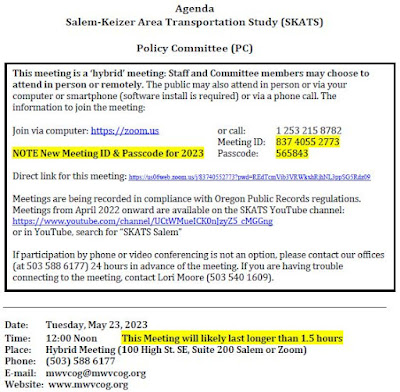The Policy Committee for our Metropolitan Planning Organization meets on Tuesday the 23rd at noon for a formal Public Hearing and then adoption of the 2023-2050 Metropolitan Transportation Plan.
About the long-range plan it has been a struggle to zero in on useful comment. Its project list is long and broad, and it is the short-term plan and that project list that actually instantiates funding decisions. So from here the short-term plan and list has seemed to be the more important document.
Moreover, the long-range plan needs not merely minor fixes to language or other detail, but instead needs a comprehensive revision to bring it into the 21st century. Revision might not be strong enough, in fact. It might need to be completely rebuilt from the bottom up.
However, since there are Federal requirements and other regulatory demands the document must satisfy, this might not be possible. But that's what it needs. Without that wholesale revision/rebuilding, it's hard to say what might be the most constructive set of edits. Most of the changes just seem like tinkering on the edges.
Here are a couple of higher level themes others have expressed.
Our 350.org chapter highlights the ways the document still fundamentally fails to account for induced demand and climate. They "object strongly to the emphasis in the draft MTP on expanding capacity of existing roadways. Study after study shows that road widening does not significantly reduce traffic congestion."
 |
| 350.org comment on induced demand (Yellow in original, red added) |
Separately, Cherriots commented extensively on the draft and noted the striking absence of transit in the goal statements. A few lines were subsequently added in the most recent draft, but transit as an efficiency measure, as the foundation of multimodalism, and a keystone for emissions reductions and environmental mitigation is insufficiently central. It's still very autoist with transit on the margins.
 |
| Striking lack of transit in goals |
They also had what might be the single best comment on a bike "facility", about the mess of paths and ramps at 12th, 13th, and Mission: "RU kidding? Is this REALLY in our BIKE system?? Never in a million years would I try to ride my bike on one of those swirly ramps."
 |
| Cherriots comment on ramp spaghetti on Mission/13th (red box and arrow added) |
Lines on a map, however defective the underlying facility might be, still count officially as a facility, and enable jurisdictions to make empty claims for completeness and usefulness.
Also in the packet are some notes from the April meeting.
In a review of comments for the Transportation Safety Action Plan, they highlighted speed and that the danger was from cars, not from "distracted walking" "bad bicycling" or other non-auto "misbehavior." The problem was speed, cars, and drivers.
 |
| From April minutes on safety |
There was also some clarification about phases on McGilchrist and costs.
 |
| From April on McGilchrist |
And a little discussion on the undemocratic voting structure (a little like the US Senate) in which Turner and Aumsville would have one vote each, identical to the single vote of the City of Salem. In 2021 Salem had 63% of the MPO area population, but had only had 12% of the vote; similarly, Turner had less than 1% of the population, and still had 12% of the vote. The voting structure and insistence on unanimity gives small towns and rural interests minority share veto power. It is weighted for rural and ruralish interests, and does not give fair weight to the actual metropolis (relatively speaking) in our Metropolitan Planning Organization.
 |
| From April minutes on Aumsville and voting |
Finally, buried in an appendix is a bit on the travel model, and something the MPO should do as part of its validation processes is to go back to earlier modeling and comparing modeled forecasts with actuals. It's great that the model is "tuned" to current conditions for the baseline, but as part of the validation it should look at older predictions, the variance, and as we've said many times here, publish a margin of error on the forecasting. (And more here.) Refusing to assess old forecasts, and refusing to make clear any error bars on current forecasts, are institutionalized ways the MPO, the City, and other jurisdictions avoid engaging with induced demand.
 |
| On the travel model |
The meeting and hearing is on Tuesday the 23rd at noon. The agenda and meeting packet can be downloaded here, and the MTP materials here.
 |
| Meeting info (yellow in original) |


1 comment:
(Edit: Deleted the word "gerrymander," which on further reflection was not accurate, and revised the paragraph on voting structure.)
Post a Comment